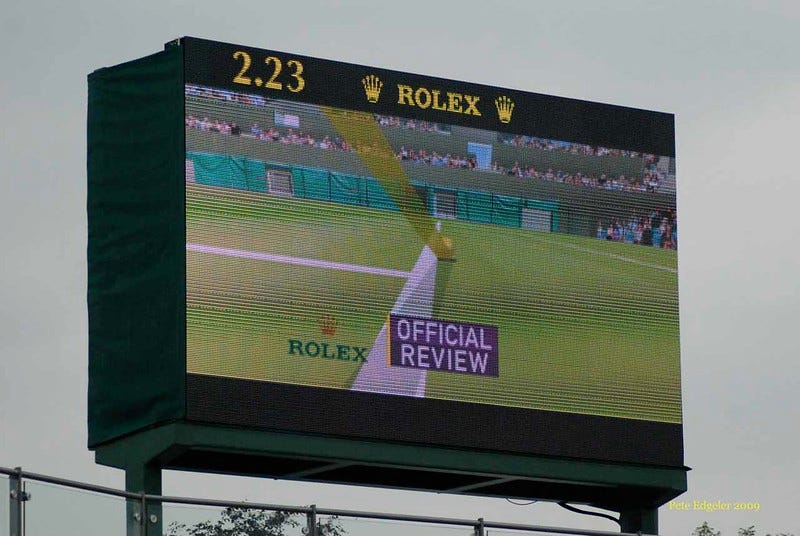Eurovision sends a lesson to tennis
One can only hope it is the sound of Waterloo that the players’ unions are hearing

The Wimbledon tennis tournament has banned Russian and Belarusian players from participating this year because of the war in Ukraine. Yesterday, the men’s and women’s tennis associations decided to strip Wimbledon of its ranking points. Contrast that with events just one week ago when the Eurovision Song Contest took place having banned Russia and with Ukraine sweeping to victory on a massive popular vote.
I can’t claim to have watched Eurovision for many years, but the results are helpfully provided here.1 The audience watching and listening from their homes awarded the Ukrainian entry an extraordinary 439 points out of a possible 468. That equates to 36 countries out of 39 voting Ukraine into first or second place, with two of the remaining three countries placing Ukraine third and one fourth. And let’s not kid ourselves that all those countries loved the song.
We know that winning mattered to Ukraine. The mere fact that the performers – men of fighting age – had been allowed out of the country for the contest told us that.
Compare the Eurovision audience’s delight at the banning of Russia with that of the two tennis bodies, ATP (men) and WTA (women). Both organisations currently adorn their websites with ribbons in the colours of Ukraine, but they have chosen to take action against Wimbledon for excluding Russian and Belarusian players from this year’s tournament.
Despite many commentators describing the decision to remove ranking points as akin to demoting Wimbledon to an exhibition event, they are wrong. Wimbledon will be broadcast around the globe and the winners will go down in history, regardless of the impact on their rankings, not to mention being paid at least £1.7m in each of the two singles events. And with at least £48,000 on offer just for being accepted into the first round, who amongst the eligible players won’t want to turn up?
It’s not at all clear who the ATP and WTA think they are punishing by withdrawing ranking points. Not the tournament itself, clearly.
One group who will lose out – whether or not that is the intention – are the players who earned ranking points last year. That is because the ranking system works on a rolling 12-month basis. Novak Djokovic currently sits on top of the ATP ranking with 8,660 points, of which 2,000 were derived from winning Wimbledon in 2021. In second place is Daniil Medvedev, not far behind with 7,980 points, including just 180 earned at last year’s Wimbledon. A lot may change between now and the start of the tournament in July, but if Wimbledon’s ranking points were stripped away now, Medvedev would automatically overtake Djokovic to become the men’s tennis world No 1.
As it happens, Medvedev is Russian. As unfair as some might think it that he should be banned from playing at this year’s tournament on account of his nationality, and not because of anything he has done, there is a war going on and war hurts all sorts of people in all sorts of ways. Ask the Ukrainians. Ask anyone struggling with the current food and energy price rises.
The ATP’s statement on the matter suggests that they are in a sulk because Wimbledon didn’t involve them in the decision. “Unilateral decisions of this nature”, the ATP says, “set a damaging precedent for the rest of the Tour … [and are] simply not viable on a Tour that operates in more than 30 countries.”
The WTA has a more principled stance. It:
believes that individual athletes participating in an individual sport should not be penalized or prevented from competing solely because of their nationalities or the decisions made by the governments of their countries.
That is an honourable enough aspiration, but naïve and unrealistic, nonetheless. So long as Governments can, and do, take decisions that wreak violence and terror on citizens of other countries, there are individuals who are penalised and prevented from following their chosen path. Sportswomen and men are not exempt from that reality.
The statements from both the ATP and the WTA appear to leave the door open for a re-think by the organisers of Wimbledon. I can only hope they have the courage of their convictions and recall these famous words from Baker and others in 1981:
Trust your inner vision. Don't let others change your mind.
The Eurovision Song Contest was a timely reminder of just how nationalistic people, and Governments, can be. It is unfortunate for tennis players from Russia and Belarus that they will be denied the opportunity to play at this year’s Wimbledon. But taking away the tournament’s ranking points won’t get them back into the draw.
The voting is in two parts: a vote by professional juries (“Jury”) and a public vote by viewers and listeners (“Tele”).



